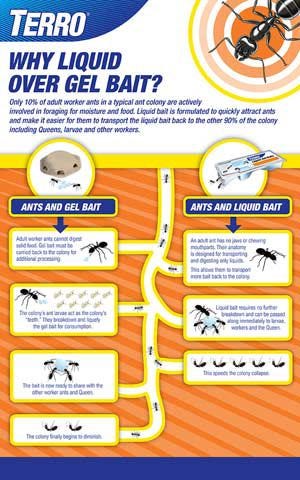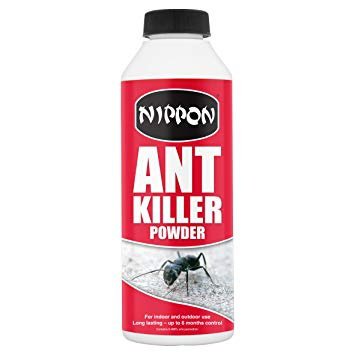Ant poison can be fatal to humans if consumed in sufficient quantities. The toxicity depends on the type and amount of poison ingested.
Ant poisons, often containing borax, hydramethylnon, or fipronil, are designed to target pests, but they pose a risk to human health if misused. Accidental ingestion, particularly by children, can lead to serious health complications and, in rare cases, death. Ensuring proper use and storage of these chemicals is crucial to prevent accidental poisoning.
It’s important for anyone handling ant poison to follow the manufacturer’s instructions and to keep these substances out of reach of children and pets. In the event of ingestion, immediate medical attention is essential. Safety data sheets (SDS) provide vital information on handling emergencies involving these products, a resource everyone using ant poisons should familiarize themselves with to mitigate risks effectively.
Credit: www.quora.com
The Toxicity Of Ant Poison
Many homes use ant poison to deal with pesky invasions. Yet, few realize ant poison can be harmful to humans. This section uncovers the risks associated with ant poison’s toxic elements.
Active Ingredients In Ant Poisons
Ant poisons contain various chemicals aimed at eliminating ants. Some common active ingredients include:
- Boric Acid – Often used in liquid and gel baits.
- Avermectin – Found in some granular ant baits.
- Fipronil – A common ingredient in gel baits.
- Indoxacarb – Used in ant bait stations.
While these compounds are effective against ants, they must be handled with caution to prevent unintended harm.
Mechanism Of Action
The way ant poison works is both intriguing and alarming. Here’s how:
| Ingredient | Mechanism of Action |
|---|---|
| Boric Acid | Disrupts ants’ stomachs and nervous systems. |
| Avermectin | Interferes with nerve and muscle functions. |
| Fipronil | Blocks GABA-gated chloride channels. |
| Indoxacarb | Blocks sodium channels in the nervous system. |
These actions are designed to target ants. However, they could pose health concerns for humans if exposed in high amounts.
Ant Poison Vs Human Physiology
The interaction between ant poison and human physiology piques interest and concern alike. While small insects succumb to these substances, how do they affect humans?
Comparative Metabolism
Humans and ants process substances differently. Our metabolic pathways are more complex. We break down toxins in ways ants can’t. This enables us to neutralize and eliminate many poisons effectively.
- Enzymes in human livers can detoxify chemicals.
- Humans have kidneys that filter out toxins via urine.
Size Matters: Dose Relevance
The size of a creature often determines the poison’s impact. What may be deadly for ants could have little effect on humans, due to the difference in scale.
| Organism Size | Typical Ant Poison Dose | Relative Human Impact |
|---|---|---|
| Ant | Small | Deadly |
| Human | Large | Low (Generally) |
For a substance to harm a human, a significantly higher dose than what would affect an ant is usually required. Still, caution is paramount as individual sensitivities vary.
- Always keep poisons away from children.
- Use ant poisons strictly as directed on labels.
Historical Data On Poisoning Incidents
Exploring Historical Data on Poisoning Incidents reveals eye-opening insights into the dangers of ant poison to human health. Through the years, cases of ant poison exposure provide valuable lessons on safety and prevention. This data helps understand risks and shapes guidelines for safer handling of poisons.
Accidental Exposure Cases
Accidental exposure to ant poison is a serious issue. Children and pets are most at risk. They may ingest these substances out of curiosity or accident. Reports from poison control centers show that most incidents involve minimal to no harm when treated quickly. But, effects can vary based on poison type and amount. Here are examples:
- Household Incidents: Ant baits mistaken for food or candy.
- Outdoor Encounters: Sprays and granules in gardens where children play.
Intentional Poisoning Reports
Intentionally using ant poison to harm a human is rare but has occurred. History shows some individuals used these chemicals with bad intent. Such cases often end with severe consequences, sometimes fatal. Medical journals document these incidents, stressing the need for awareness and stricter regulation.
- Legal cases of poisoning involving ant chemicals.
- Documented symptoms and outcomes of intentional poisonings.
- Changes in laws following major incidents.
Symptoms Of Ant Poison Ingestion In Humans
Understanding the risk ant poisons pose to humans is crucial. Accidents happen. Knowing the symptoms could save a life. Read on to spot the danger signs early.
Short-term Effects
Short-term effects show up fast. Look for these symptoms:
- Nausea and vomiting: Upset stomach or throwing up.
- Dizziness: Feeling unsteady or lightheaded.
- Headaches: Pain in the head or tension.
- Difficulty breathing: Trouble catching breath.
- Skin irritation: Rash or redness on the skin.
Long-term Consequences
Ingesting ant poison may lead to bigger problems. Long-term effects include:
| Symptom | Description |
|---|---|
| Organ Damage: | Chemicals harm internal organs. |
| Neurological Issues: | Affecting the brain or nerves. |
| Allergic Reactions: | Immune system fighting hard. |
Medical Treatment For Ant Poison Exposure
Getting exposed to ant poison is a serious matter. It might happen at home or outdoors. Quick action can lower the risk of harm. Learn the right steps to deal with this emergency.
First Aid Measures
Fast reaction is vital when someone gets exposed to ant poison. Here is what to do:
- Stay calm and remove the person from the poison area.
- If the poison is on the skin, wash it off with lots of water.
- Remove contaminated clothing carefully.
- Do not make the person vomit unless told by poison control or a health professional.
Hospital Interventions
At the hospital, treatment depends on the poison type and the symptoms. Doctors may use:
- Activated charcoal to absorb poison.
- Medicine to ease symptoms.
- Breathing support if needed.
- IV fluids to prevent dehydration.
It’s important to bring the ant poison package to the hospital. It helps doctors choose the best treatment.

Credit: www.terro.com
Risk Assessment: How Much Is Too Much?
When considering the dangers of ant poison, it’s crucial to know how much exposure is harmful. Humans encountering ant poison might wonder about its toxicity. This section examines the line between safe levels and potential danger.
Calculating Lethal Doses
The term “LD50” refers to the amount of a substance that can kill half of a test population. This measurement helps us understand the risk ant poisons can pose to humans.
LD50 values often come from animal studies. Experts apply these findings to humans with caution.
| Type of Ant Poison | Estimated LD50 (mg/kg for humans) |
|---|---|
| Boric Acid | 2,660 |
| Arsenic Trioxide | 14 |
| Fipronil | 97 |
This table shows the wide variability in toxicity among common ant poisons.
Factors Influencing Toxicity
Different factors can change how poison affects a person:
- Body weight: Heavier people may tolerate more poison.
- Age: Children are more sensitive due to their size and development.
- Health status: Pre-existing conditions may worsen the impact.
Poisons come in various forms, such as liquids, powders, or gels. Exposure can occur through:
- Ingestion
- Skin contact
- Inhalation
Each route of exposure carries a unique risk level and requires careful consideration.
Prevention Strategies And Safe Usage
Using ant poison requires caution to keep everyone safe. Ensuring it doesn’t harm humans is vital. We will explore how to store and apply ant poison properly. Let’s dive into the best strategies for prevention and safe usage.
Safe Storage Practices
Keeping ant poison out of reach is critical. Here’s how to store it securely:
- Lock it away: Use a cabinet with a childproof lock.
- Original containers: Always keep poisons in their original packaging.
- Label clearly: Ensure each product has a readable label.
- Avoid food areas: Store far from food or drink to prevent contamination.
Proper Application Techniques
Applying ant poison needs attention to detail. Follow these steps:
- Read instructions: Every product has guidelines.
- Use protective gear: Gloves and masks are must-haves.
- Apply with precision: Place poison only in targeted areas.
- Avoid overuse: More doesn’t mean better with chemicals.
After application, clean tools and wash hands thoroughly. It prevents accidental poisoning.
Remember, safety always comes first! By adhering to these practices, we ensure the well-being of our loved ones while effectively tackling ant problems.
Public Health Implications
The issue of whether ant poison can harm humans warrants serious consideration. This concern especially touches families with young children and pets. Exposure to ant poison can have various effects. It is crucial to understand these dangers to protect public health.
Educational Campaigns
Public awareness is the first line of defense. We need educational campaigns to tell the public about these risks. Such campaigns would guide people on safe use. They also show how to keep poison away from children and pets. Here are some strategies:
- Workshops in schools and community centers.
- Use social media to spread key messages.
- Pamphlets and flyers in local businesses.
These initiatives can greatly reduce accidental poisonings. They can save lives.
Policy And Regulation
Robust policy and regulation are vital. They ensure the safe manufacture and sale of ant poisons. Strong rules can prevent harm. Consider these proposals for regulators:
- Strict labeling requirements, making dangers clear.
- Guidelines on packaging, to make products child-resistant.
- Controlled sale processes, keeping poisons from minors.
By adhering to these policies, manufacturers and retailers help safeguard health. Everyone plays a part. Together, we keep our homes and communities safe.

Credit: www.poison.org
Frequently Asked Questions For Can Ant Poison Kill Humans
Is Ant Poison Dangerous To Humans?
Ant poison contains chemicals that can be harmful to humans if ingested or inhaled in large quantities. It’s designed to target insects’ nervous systems and can cause adverse reactions in people, especially children and pets, who are more sensitive to these toxins.
What Symptoms Do Ant Poison Cause In Humans?
Symptoms of ant poison ingestion in humans include nausea, vomiting, diarrhea, and abdominal pain. Inhaling fumes may cause respiratory irritation, coughing, and difficulty breathing. Seek medical attention if you suspect poisoning has occurred.
Can Touching Ant Poison Affect Your Health?
Direct skin contact with ant poison may lead to irritation, such as redness and itching. It should be handled with gloves to prevent absorption through the skin. Always wash your hands thoroughly after any contact.
How Much Ant Poison Is Lethal To Humans?
The lethality of ant poison to humans depends on the active ingredients and the amount ingested. However, large amounts can be fatal, especially in children or those with weakened immune systems. Keep ant poison out of reach and follow usage instructions carefully.
Conclusion
To sum up, ant poison does carry risks to human health if ingested. While not typically deadly, caution is vital. Always keep it away from children and pets, and use as directed. Seek medical help promptly if exposure occurs. Your safety is paramount when handling any toxic substance.
Stay informed and stay safe.

I’m MD Tanvir, and I bring years of expertise gained from working closely with pest control companies to the forefront. My journey in the industry has inspired me to launch Bug Battler, a platform aimed at equipping people with the know-how to combat pests autonomously. Through Bug Battler, I aim to empower individuals with practical insights to tackle pest infestations effectively.

